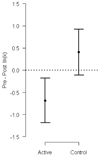Remember the future: working memory training decreases delay discounting among stimulant addicts
- PMID: 20965498
- PMCID: PMC3015021
- DOI: 10.1016/j.biopsych.2010.08.017
Remember the future: working memory training decreases delay discounting among stimulant addicts
Abstract
Background: Excessive discounting of future rewards has been observed in a variety of disorders and has been linked both to valuation of the past and to memory of past events.
Methods: To explore the functionality of discounting and memory, we examined whether training of working memory would result in less discounting of future rewards. In this study, 27 adults in treatment for stimulant use were randomly assigned to receive either working memory training or control training according to a yoked experimental design. Measures of delay discounting and several other cognitive behaviors were assessed pre- and posttraining.
Results: Rates of discounting of delayed rewards were significantly reduced among those who received memory training but were unchanged among those who received control training; other cognitive assessments were not affected by memory training. Discount rates were positively correlated with memory training performance measures.
Conclusions: To our knowledge, this is the first study demonstrating that neurocognitive training on working memory decreases delay discounting. These results offer further evidence of a functional relationship between delay discounting and working memory.
Copyright © 2011 Society of Biological Psychiatry. Published by Elsevier Inc. All rights reserved.
Conflict of interest statement
All authors report no biomedical financial interests or potential conflicts of interest.
Figures


Comment in
-
Computerized cognitive remediation treatment for substance abuse disorders.Biol Psychiatry. 2011 Feb 1;69(3):197-8. doi: 10.1016/j.biopsych.2010.11.016. Biol Psychiatry. 2011. PMID: 21199708 No abstract available.
References
-
- Madden GJ, Bickel WK. Impulsivity: The behavioral and neurological science of discounting. Washington, D.C.: American Psychological Association; 2009.
-
- Bickel WK, Marsch LA. Toward a behavioral economics understanding of drug dependence: Delay discounting processes. Addiction. 2001;96(1):73–86. - PubMed
-
- Reynolds B. A review of delay-discounting research with humans: Relations to drug use and gambling. Behavioural Pharmacology. 2006;17(8):651–667. - PubMed
-
- Weller RE, Cook EW, III, Avsar KB, Cox JE. Obese women show greater delay discounting than healthy-weight women. Appetite. 2008;51(3):563–569. - PubMed
Publication types
MeSH terms
Grants and funding
LinkOut - more resources
Full Text Sources
Other Literature Sources
Medical
Miscellaneous

